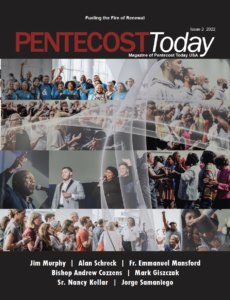Sunday, September 2, 2018
22nd Sunday in Ordinary Time
Meditation and Questions for Reflection or Group Discussion
Mass Readings:
1st Reading: Deuteronomy 4:1-2, 6-8
Responsorial: Psalm 15:2-5
2nd Reading: James 1:17-18, 21-22, 27
Gospel: Mark 7:1-8, 14-15, 21-23
Be doers of the word. (James 1:22)
In today’s second reading, James compares the Scriptures to a mirror. When we read the word of God, or when we hear it proclaimed at Mass, we often see ourselves in the stories and teachings it contains. Scripture helps us “discern reflections and thoughts of the heart,” both the good thoughts and the not so good ones (Hebrews 4:12). Scripture can expose our pride, confront our resentments, or uncover our deception, greed, or lust. But at the same time, Scripture assures us that God made us in his image. It convinces us that God loves us and that his grace is more than enough to change our lives.
But no matter how much grace God has for us, James tells us that it’s not enough just to hear the word of God—not if we want to see any significant changes in the sinful areas of our lives. Similarly, just hearing the word of God won’t result in a growth in our gifts and virtues. We have to be “doers of the word” as well as “hearers” (James 1:22).
James gives us a wonderful image to help make this point: someone who hears the word but doesn’t put it into action “is like a man who looks at his own face in a mirror. He sees himself, then goes off and promptly forgets what he looked like” (James 1:23-24).
James isn’t speaking about a poor memory here. He’s speaking about poor priorities. People “forget” Scripture because they have placed other priorities ahead of following the Lord.
The word of God does have the power to help us—but only to the degree that we cooperate with it. So be sure to read Scripture each day. But also be sure to write down one action step you can take based on what you have read. Then, dedicate your day to taking that one step at every opportunity. Let it help you say no to sin and yes to God today. If you do, you will be “blessed” beyond your expectations (James 1:25)!
“Lord, I welcome your word.”
(Many thanks to The Word Among Us (www.wau.org) for allowing us to use meditations from their monthly devotional magazine. Used with permission.)

Questions for Reflection or Group Discussion:
- The first reading begins with these words of Moses: Now, Israel, hear the statutes and decrees which I am teaching you to observe, that you may live, and may enter in and take possession of the land which the LORD, the God of your fathers, is giving you. In your observance of the commandments of the LORD, your God, which I enjoin upon you, you shall not add to what I command you nor subtract from it. Moses goes on to tell them the following: Observe them carefully, for thus will you give evidence of your wisdom and intelligence to the nations.
- Why do you think Moses warned the Israelites to keep God’s law, not adding or subtracting from it?
- Why do you believe Moses told the Israelites that obedience to the commandments of God would be a great witness to other nations and would bring glory to God? How does this apply to you?
- In the Responsorial Psalm, the psalmist describes some ways we can live out our faith in our daily actions: Whoever walks blamelessly and does justice; who thinks the truth in his heart and slanders not with his tongue. Who harms not his fellow man, nor takes up a reproach against his neighbor; by whom the reprobate is despised, while he honors those who fear the LORD. Who lends not his money at usury and accepts no bribe against the innocent.
- Why is doing what the psalmist describes more than just a matter of trying harder to do better, but requires a greater reliance on the grace of God and the power of the Holy Spirit?
- The responsorial psalm ends with these words of encouragement: Whoever does these things will not be disturbed (Psalm 15:5). Why is our interior peace so dependent on living a godly life?
- In the second reading, St. James tells us the following: Humbly welcome the word that has been planted in you and is able to save your souls. Be doers of the word and not hearers only, deluding yourselves. The reading ends with these words: Religion that is pure and undefiled before God and the Father is this: to care for orphans and widows in their affliction and to keep oneself unstained by the world.
- What do these words mean to you: Be doers of the word and not hearers only, deluding yourselves? In what ways do these words require us to continue to grow spiritually and experience God’s transforming love?
- The ending words of the reading tells us to reach out more to others, especially “orphans” and “widows,” that is, others less fortunate than us. What additional steps can you take to do this?
- In the Gospel, Jesus presents examples where the Pharisees and scribes have added to God’s law their own commandments to the people, for example, do not eat without carefully washing their hands, do not eat without purifying themselves, and the purification of cups and jugs and kettles and beds. He then quotes this prophesy of Isaiah: This people honors me with their lips, but their hearts are far from me; in vain do they worship me,
teaching as doctrines human precepts. Jesus then concludes with these hard words: You disregard God’s commandment but cling to human tradition.
- In what ways are Jesus’ words a warning against religious observances that are purely external and ritualistic?
- What can we do in our celebration of the Eucharist, and other Sacraments, that will allow us to experience greater renewal in our inner selves, so that we are able to manifest the love and compassion of Christ to others?
- The meditation is a reflection on the second reading, especially these words from James 1:22: Be doers of the word and not hearers only. It ends with these words: “James isn’t speaking about a poor memory here. He’s speaking about poor priorities. People “forget” Scripture because they have placed other priorities ahead of following the Lord. The word of God does have the power to help us—but only to the degree that we cooperate with it. So be sure to read Scripture each day. But also be sure to write down one action step you can take based on what you have read. Then, dedicate your day to taking that one step at every opportunity. Let it help you say no to sin and yes to God today. If you do, you will be “blessed” beyond your expectations (James 1:25)”
- Do you believe that one of the problems in being doers of the word is that we have “placed other priorities ahead of following the Lord”? Why or why not?
- Do you agree with the meditation that “The word of God does have the power to help us—but only to the degree that we cooperate with it”? In what way?
- How important to you is trying to read Scripture and reflect on them every day? Do you believe that “If you do, you will be “blessed” beyond your expectations”?
Take some time now to pray and thank the Lord for the Scriptures, and ask him for the grace to be a better “hearer” and “doer” of his word to you. Use the prayer below from the end of the meditation as the starting point.
“Lord, I welcome your word.”
[The discussion questions were created by Maurice Blumberg, who is currently a member of the board of directors of the ChristLife Catholic Ministry for Evangelization (www.christlife.org), a member of the National Service Committee Council of the Catholic Charismatic Renewal (www.nsc-chariscenter.org), and a board member of The Love of Christ Foundation. Prior to this, Maurice was the founding executive director of the National fellowship of Catholic Men, a chairman of the board of The Word Among Us (www.wau.org), and a director of partner relations for The Word Among Us Partners ministry. He can be contacted at (Enable Javascript to see the email address) mblumberg@wau.org or mblumberg@aol.com.]

 Click Here for us to pray for your intentions through our new website.
Click Here for us to pray for your intentions through our new website. 
